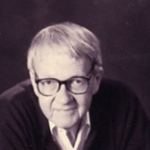The black kitten cries at her bowl
meek meek and the gray one glowers
from the windowsill. My hand on the can
to serve them. First day of spring.
Yesterday I drove my little mother for hours
through wet snow. Her eightieth birthday.
What she wanted was that ride with me—
shopping, gossiping, mulling old grievances,
1930, 1958, 1970.
How cruel the world has been to her,
how uncanny she’s survived it.
In her bag, a birthday card
from “my Nemesis,” signed Sincerely
with love—“Why is she doing this to me?”
she demands, “She hates me.”
“Maybe
she loves you” is and isn’t what Mother
wants to hear, maybe after sixty years
the connection might as well be love.
Might well be love, I don’t say—
I won’t spoil her birthday,
my implacable mother.
In Byfield,
in the snowstorm, we bought things
at an antiques mall, she a miniature
Sunbonnet baby creamer and saucer—
a bargain!—I, a chrome ice bucket
stamped with penguins, with Bakelite handles.
I wanted it, I had one just like it
I’m sure I want is what I have.
“What do you wish for?” I asked
a friend, I was so curious to know
how he’d formulate a wish, to know
if there is a formula. His list
was deliciously simple, my friend
the hedonist: a penthouse with a concierge,
“wonderful food,” months in Mexico,
good movies . . . .
Last night, you and I
watched “The Way We Were” and I cried—
I always do—for the wanting in it,
and the losing. “It’s a great movie,”
I said, to justify my tears. I wish
you were more like me. Streisand and Redford,
so opposite it’s emblematic, almost
a cliché. Each wants or needs the other
to change, so the pushy Jewish lefty,
Barbara, should be quiet, accommodating,
and the accommodating, handsome, laid-back
“nice gentile boy” should agree with her
that people are their principles.
He thinks people can relax a little,
be happy. If only
they could both become
nothing, they can stay together.
All her wishing and wanting and needing
won’t make that happen. She marches
against the Nazis, the Blacklist, the bomb,
through the movie decades, and he doesn’t
want to be a great unpopular novelist,
so he writes badly for movies,
and later, television.
At the end
(it’s the early ’60s), when they meet again
in front of the Plaza, his look—the blank
Redford quizzicality I’ve learned
is his whole expressive repertoire—
seems to ask, “Why? Why did I love you?
Why do I still? Why aren’t you
like me?”
And because the director’s
a liberal, Streisand’s the wiser one,
more human than Redford—she’s leafletting,
to ban the bomb, in the ’70s she’ll be
Another Mother for Peace—the way
she wriggles her sensual mouth
(a mannerism that’s become familiar
in the years since this movie was new)
I know she loves him or at least yearns
for him, still wants him, which is more
piercing, more selfish.
This morning, my throat
is constricted, my head aches, I’m always
like this, this movie reminds me you don’t get
what you want, even if you’re not weak,
or mean, or criminal. I wish I didn’t
believe that message so utterly. Today
I need to believe something more useful,
more positive.
Once, when I was a child,
my mother lied to me. Maybe that day
I was too demanding, more likely I needed
consolation—my schoolmates so lucky,
so confident, so gentile. Either
she meant to reassure me, or—more likely—
to instruct when she said (she couldn’t have
believed it, the ’40s had happened)
that the meek inherit the earth. That was
lesson one of our course in resignation.
My little mother,
little kitten,
be patient, I’m trying, it’s for you
I’m opening this can of worms,
for you I’m opening this can of food.



















Comment form: